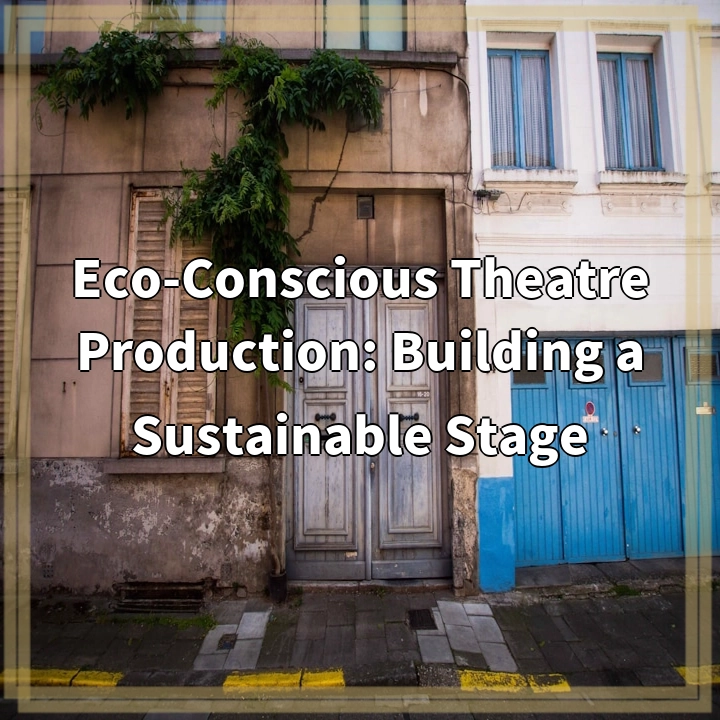
What is Eco-Conscious Theatre Production?
Eco-conscious theatre production is a movement within the performing arts industry that focuses on reducing the environmental impact of theatrical productions. It involves implementing sustainable practices and making conscious choices throughout the planning, design, construction, and running of a theatrical production.
Real-World Problems Associated with Eco-Conscious Theatre Production
The shift towards eco-conscious theatre production is a response to several pressing environmental challenges facing the industry. These challenges include:
1. Carbon Footprint
Theatre productions often consume significant amounts of energy and contribute to carbon emissions. From lighting and sound equipment to set construction materials and transportation, every aspect of a production’s operations affects its carbon footprint.
2. Waste Generation
Traditional theatre productions generate a substantial amount of waste, including discarded sets, costumes, props, and promotional materials. Many of these items end up in landfills, contributing to environmental pollution.
3. Resource Depletion
Theatre production relies heavily on natural resources such as timber, water, and energy. Unsustainable practices can deplete these resources, leading to deforestation, water scarcity, and increased energy consumption.
4. Chemical Usage
Various chemicals are used in theatre production, from paints and adhesives to cleaning agents and makeup. These substances can be harmful to both human health and the environment when not handled and disposed of properly.
5. Lack of Awareness and Education
Many theatre professionals and stakeholders are not fully aware of the environmental impact of their production practices. Limited access to information and training on sustainable alternatives hinders progress towards eco-conscious theatre production.
6. Financial Constraints
Sustainable alternatives and eco-friendly technologies often come with higher costs, making it challenging for smaller theatre companies and productions with limited budgets to invest in environmentally friendly practices.
7. Audience Engagement
Fostering environmental consciousness among theatre audiences poses a significant challenge. Communicating the importance of eco-conscious practices and encouraging sustainable behavior can be a complex task in an industry largely driven by aesthetics and entertainment.
In the face of these challenges, eco-conscious theatre production aims to tackle these problems head-on by implementing sustainable practices, raising awareness, and fostering collaboration within the industry.

Solutions for Eco-Conscious Theatre Production
Eco-conscious theatre production offers a range of solutions to address the environmental challenges faced by the industry. Some of these solutions include:
1. Energy Efficiency
Implementing energy-efficient technologies, such as LED lighting and energy-saving equipment, can significantly reduce the carbon footprint of theatre productions. Additionally, adopting practices like scheduling rehearsals and performances to optimize energy usage can contribute to energy conservation.
2. Waste Reduction and Recycling
By rethinking set and prop designs, reusing materials, and implementing proper recycling systems, theatre productions can minimize waste generation. Creating partnerships with local recycling facilities and donating unused items to other productions or community organizations can further reduce waste.
3. Sustainable Material Choices
Opting for sustainable and ethically sourced materials, such as reclaimed wood for sets or eco-friendly fabrics for costumes, can help reduce the impact on natural resources. It is important to select materials with lower chemical content and explore alternatives that are biodegradable or recyclable.
4. Education and Training
Providing accessible information and training programs on eco-conscious practices is crucial for industry professionals and theater students alike. Educational initiatives can create awareness about the importance of sustainability and equip individuals with the skills needed to implement environmentally friendly practices.
5. Partnerships and Collaboration
Collaborating with environmental organizations, green suppliers, and sustainability-focused businesses can help theater productions gain access to sustainable alternatives and resources. Sharing knowledge, experiences, and best practices within the industry can accelerate the adoption of eco-conscious production methods.
6. Audience Engagement and Outreach
Engaging and inspiring theater audiences to embrace sustainability is vital. Productions can communicate their commitment to eco-conscious practices through pre-show announcements, informational materials, and post-show discussions. Encouraging recycling, promoting public transportation, or integrating ecological themes into performances can also raise audience awareness.
By implementing these solutions, the theatre industry can make significant progress in building a sustainable stage and contributing to a greener, more environmentally conscious future.















